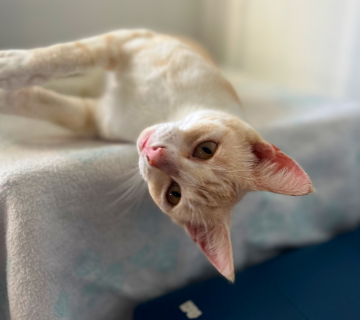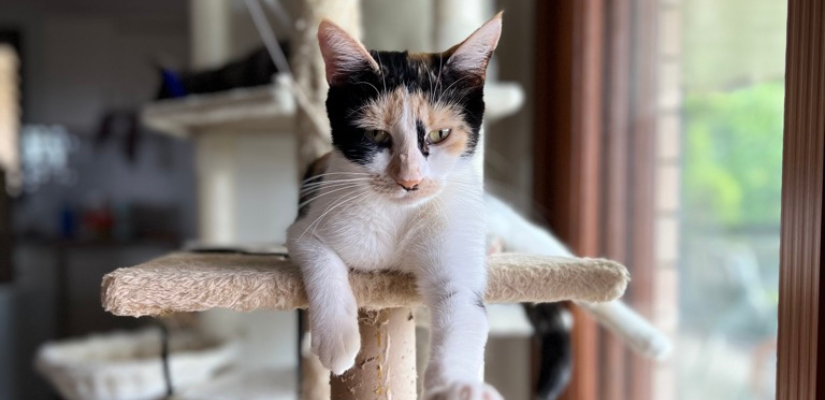As a cat owner, it can be concerning to notice that your feline friend has poop stuck in their anus. While this issue may seem uncomfortable for both you and your cat, it’s essential to address it promptly for the sake of your pet’s health and well-being.
Cats commonly experience poop getting stuck in their anuses or on their bum. This is often due to their short digestive tracts and tiny intestines, making defecation challenging.
In this blog, we’ll explore some common reasons why cats may experience difficulties with bowel movements and offer guidance on how to handle the situation.
Possible Causes of Poo Stuck in or on cats:
Fur Clumps:
Cats are meticulous groomers, but sometimes their self-cleaning habits can lead to the ingestion of excessive fur. This ingested fur may accumulate in the digestive tract, causing difficulty during elimination and resulting in poop getting stuck.
Dehydration:
Insufficient water intake can lead to dry and hard stools, making it challenging for your cat to pass them. Dehydration may be caused by various factors, such as an inadequate water supply or an underlying health issue.
Dietary Issues:
Inappropriate or high or low-fiber diets can contribute to constipation in cats. To much fibre or lack of fiber can result in hard stools, making it difficult for your cat to expel waste comfortably.
Medical Conditions:
Certain medical conditions, such as megacolon, pelvic injuries, or tumors, can obstruct the normal flow of stool. These conditions may require veterinary attention for proper diagnosis and treatment.
Litter Box Problems:
Some cats may avoid using the litter box due to discomfort or anxiety associated with the contents of the liter box, the type of litter litter or the location of the box. This can lead to irregular bowel movements and issues with elimination.
Cat Constipation
Constipation, the condition where feces gets stuck, can lead to discomfort and, if prolonged, may cause abscess formation in the rectum, leading to complications. The exact cause of constipation in cats is often unknown, making diagnosis difficult.
Poop can get stuck when it becomes excessively dry or hard, making it challenging for the elastic rectum to stretch enough to empty the colon and intestines. Constipation is a common issue in cats, which occasionally leads to significant abdominal pain requiring veterinary attention.
Cats may occasionally expel their feces by straining, even doing so outside the litter box in random places. On average, cats poop 2-3 times a day, but the frequency can vary based on breed, age, and individual differences.
If your cat’s poop becomes consistently hard or dry and hasn’t been passed for several days, it’s crucial to contact your veterinarian promptly. Regular occurrences of fecal impaction should also prompt a visit to the vet. Seeking veterinary advice is essential for proper diagnosis and management.
Addressing the Issue:
Gentle Cleaning:
If you notice poop stuck in your cat’s anus, you can gently clean the area with a damp, soft cloth and water. Aviod using any wipes or things with chemicals on it. It might burn their skin or damage their bowl. Only use water.
If there is a piece stuck you could try break it off. Or use warm water. Examine the anus area to make sure there are no cuts or injuries
If the issue persists or if there is a lot stuck that needs to be extracted, consult your veterinarian.
Dietary Changes:
Ensure your cat is on a well-balanced diet with appropriate fiber content. Consult with your veterinarian to determine the best diet for your cat’s specific needs.
Hydration:
Make sure your cat has access to fresh and clean water at all times. Many cats like running water and drink more from a water fountain. If your cat is not a fan of water, consider wet food or consult your veterinarian for alternative hydration methods.
Regular Vet Check-ups:
Schedule regular veterinary check-ups to monitor your cat’s overall health. Your veterinarian can detect and address potential issues before they escalate.
Litter Box Management:
Ensure the litter box is clean, placed in a quiet location, and contains a type of litter that your cat is comfortable with. You could try 3 or 4 different types of litter in 3 different trays in the same spot and see which one they prefer. Scoop the litter at least twice a day to maintain a sanitary environment.
Will the Poop in My Cats Anus Cause Health Issues?
Poop stuck in a cat’s anus can be a sign of underlying issues that need attention. While some causes may be resolved with simple adjustments to diet and environment, others may require professional veterinary care.
Here are some potential health issues associated with poop stuck in a cat’s anus:
- Discomfort and Pain: Constipation can cause discomfort and pain for your cat, making it a distressing experience for them.
- Complications and Abscess Formation: Prolonged constipation can lead to the formation of an abscess in the rectum. This can result in further complications and may require veterinary intervention.
- Decreased Appetite: Cats experiencing constipation may show a decreased appetite and reluctance to eat.
- Vomiting: In some cases, constipated cats may vomit or exhibit signs of nausea.
- Lethargy and Behavioral Changes: Cats with constipation may become lethargic, and their behavior may change. They may become irritable or avoid the litter box.
As a responsible pet owner, staying attentive to your cat’s habits, providing a suitable environment, and seeking veterinary advice when needed will contribute to your feline friend’s overall well-being.

Are you looking to adopt a pet or donate to a pet rescue organisation? Georgie and Cindy from Large Hope SEO foster cats and kittens on the Sunshine Coast in Australia. If you’re local, get in touch to discuss adopting from the rescues. See cats and kittens available for adoption or donate so we can save more kittens.
 seolounge
seolounge